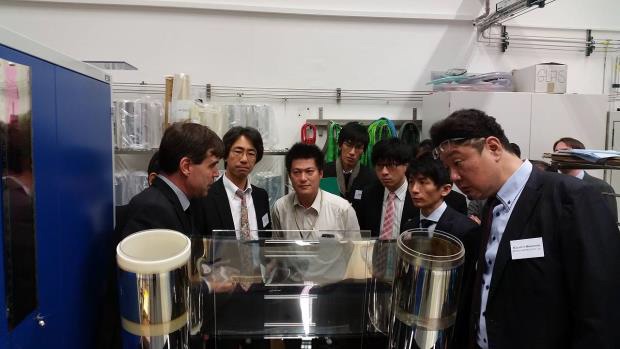Dresden | Tokio
Organic Electronics – Cutting Edge Research from Saxony Goes Global
Cooperation Projects with Japan Ready to Take Off
The international journey of the innovation cluster “Organic Electronics Saxony” (OES) is entering its next stage. Thirty partners from Germany and Japan have come together for two joint development projects, focusing on the development of stable OLEDs on flexible glass and printed 3D and organic electronics applications.
On Tuesday, 13 February 2018, the project partners from both countries met up in Tokyo to plan their next steps together. “The key is the development of innovative and marketable demonstrators”, Dr. Dominik Gronarz, Managing Director of the OES cluster, points out. “These are the perfect means to build up curiosity among possible end users. We expect that this will turbocharge the commercial rollout of flexible electronics.”
Two shared development projects with a total volume of €5 million are set to take off this year. On the German side, funding has been applied for with the Federal Ministry of Education and Research (BMBF) for both projects.
Organic Electronics Saxony has teamed up with the Saxon Business Development Agency WFS and Japan’s Yamagata University to host the sixth German-Japanese Symposium. The event brought together Saxon and Japanese experts to present and debate the newest developments in flexible, printed, and organic electronics. Almost 150 attendees joined the symposium from both countries.
The types of electronics in focus were not the only topic of interest for the event. Considerable attention was also paid to related technologies, such as the mechanical engineering capabilities in Saxony or Japan’s expertise with producing glass foils with a thickness of only a few micrometers.
The project manager, Dr. Christian Körner, emphasizes: “The challenge lies in reel-to-reel processes for handling flexible glass. The technology will truly come into its own if we manage to apply flexible electronics on this unique type of substrate.”
“nano tech”, the world’s premier expo for nano-technology in Tokyo, offered another opportunity to experience the work of the OES from 14 to 16 February. Representatives from Saxony welcomed their Japanese visitors at the shared “Saxony live” booth, organized with the support of the Saxon Business Development Agency.
To prepare its German and Japanese partners for the cultural differences between both countries and their working and negotiating styles, the Organic Electronics Saxony cluster offered special intercultural training. This gave the participants an opportunity to explore the unique qualities of their respective host nations and reflect on their own habits and practices. “There were quite a lot of unexpected insights as the takeaway for me”, one participant reports. “I did not expect to have to take my shoes off in a restaurant, but now I feel much more confident with what I might encounter.”
“Offering this service was a pleasure for us”, Jitka Barm, intercultural trainer and marketing manager at OES, explains. “It was a great help for understanding our partners and avoiding misunderstandings.”
The Cooperation Week in Japan
- Intercultural Workshop “So Japanese – So German”
- Project meeting of the cooperation partners
- 6th German-Japanese Symposium
- Exhibition at the international nano-technology expo and conference “nano tech 2018”, 14/02-16/02/2018

About the Project
Germany’s Ministry of Education and Research (BMBF) supports the Saxon project on “Organic Electronics: Promoting Commercial Prospects through the Internationalization of Organic Electronics Saxony”. Rolling out clusters and networks of this type is part of a new high-tech strategy the Federal Government has committed to as a way of turning ideas into innovations and bridging the gap between academia and business, research and society. It is also part of the BMBF’s “International Cooperation” action plan dedicated to creating new prospects and the jobs of tomorrow.
More information:
https://www.bmbf.de/de/cluster-netzwerke-international-547.html (German language)
About Organic, Printed, and Flexible Electronics
Contrasting sharply with traditional electronics, organic electronics are ultrathin, extremely lightweight, transparent, flexible, and exceptionally environmentally friendly, paving the way for new applications. This promises a lasting sea change in the design and capabilities of electronic devices. Already today, organic electronics are in commercial use in organic light-emitting diodes (OLEDs) and displays.
About Organic Electronics Saxony
Organic Electronics Saxony (OES) is Europe’s leading cluster for organic semiconductors. OES considers itself a platform for sharing technologies for the most innovative enterprises and research institutions in the field of organic, flexible, and printed electronics. Its strategic mission is the sustainable development of knowhow to turn the technologies’ many promising qualities into actual use cases and promote product designs to compete with traditional electronics.
More information: www.oes-net.de
Last modified:
 Fraunhofer Institute for Reliability and Microintegration IZM
Fraunhofer Institute for Reliability and Microintegration IZM